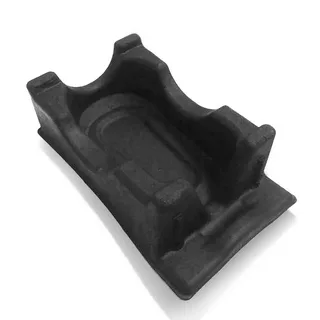Innovative Applications of Wet Molded Fiber in Various Industries

Wet molded fiber is an advanced material made from recycled paper pulp or natural fibers, offering a sustainable alternative to traditional packaging and industrial materials. Its unique molding process allows manufacturers to create custom shapes with high precision, making it suitable for a wide range of applications.
As industries worldwide prioritize sustainability, wet molded fiber has gained popularity due to its biodegradability and eco-friendly properties. Unlike plastic and Styrofoam, this material decomposes naturally, reducing environmental impact and waste accumulation.
Wet Molded Fiber in Packaging Industry
The packaging industry is one of the primary adopters of wet molded fiber, utilizing it for protective and sustainable packaging solutions. Electronics manufacturers, for instance, use wet molded fiber to create custom-fit trays and inserts that securely hold products while reducing the need for plastic packaging.
Additionally, food and beverage companies increasingly use wet molded fiber for biodegradable food containers and drink carriers. Its durability and moisture-resistant coatings make it an ideal choice for sustainable takeout packaging, aligning with global efforts to reduce plastic waste.
Automotive and Aerospace Applications
The automotive industry is embracing wet molded fiber as a lightweight, durable alternative to plastic-based components. It is used in interior vehicle parts, such as door panels and dashboard inserts, providing an eco-friendly solution that reduces the overall weight of vehicles and enhances fuel efficiency.
Similarly, the aerospace sector explores wet molded fiber for interior applications, including seatback trays and cabin dividers. By replacing traditional materials with this biodegradable alternative, airlines can contribute to sustainability efforts without compromising functionality or safety.
Medical and Healthcare Innovations
In the medical and healthcare sectors, wet molded fiber is revolutionizing disposable medical supplies. Hospitals and clinics use molded fiber trays, bedpans, and packaging for surgical instruments, ensuring hygiene while reducing reliance on single-use plastics.
Moreover, pharmaceutical companies leverage wet molded fiber for eco-friendly medication blister packs and protective cases. This application not only meets stringent safety standards but also aligns with sustainability initiatives aimed at reducing medical waste.
Consumer Goods and Retail Solutions
Retail brands are incorporating wet molded fiber into product packaging, aiming to offer environmentally responsible alternatives to plastic wrapping and foam inserts. Luxury brands, in particular, use wet molded fiber for premium packaging that conveys both elegance and sustainability.
Beyond packaging, consumer electronics manufacturers utilize wet molded fiber for speaker enclosures and other accessories. The material’s acoustic properties enhance sound quality while maintaining an environmentally conscious approach to product design.
Conclusion
As industries continue to innovate, the versatility and sustainability of wet molded fiber will drive its adoption across various sectors. Its ability to replace plastic and reduce waste makes it a key material in the shift toward eco-friendly manufacturing practices.
With advancements in material science and production techniques, the future of wet molded fiber looks promising, offering businesses a viable, sustainable alternative without compromising quality or performance. By integrating wet molded fiber into diverse applications, industries can contribute to a greener planet while meeting consumer demand for environmentally responsible solutions.
- Art
- Causes
- Crafts
- Dance
- Drinks
- Film
- Fitness
- Food
- Oyunlar
- Gardening
- Health
- Home
- Literature
- Music
- Networking
- Other
- Party
- Religion
- Shopping
- Sports
- Theater
- Wellness


